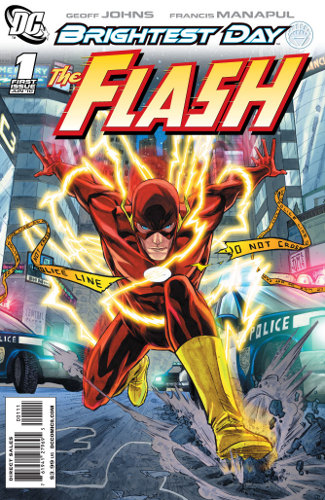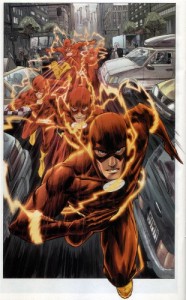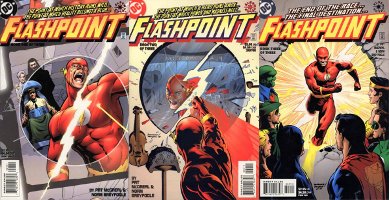 DC has been really cagey with Flash news lately, since the new direction is just getting started, but they’ve let a few hints slip at C2E2. Here’s a round-up from Newsarama and CBR’s coverage of the event.
DC has been really cagey with Flash news lately, since the new direction is just getting started, but they’ve let a few hints slip at C2E2. Here’s a round-up from Newsarama and CBR’s coverage of the event.
DC Nation was light on Flash information…though Dan Didio joked that “as far as dead meaning dead in the DCU, once we get to Nightwing and Wally West, yes.”
At the Brightest Day panel on Saturday, Geoff Johns answered a fan who was upset that Flash #1 had a “Brightest Day” banner, but didn’t tie into the book:
Johns said, “It was a good issue, wasn’t is?” before explaining that the book would tie in to what happens in “Brightest Day” in some small ways, though “I didn’t want to start Flash #1 with a white power battery. I wanted him to fight the Trickster.” Sattler added “The bannering on the books is about a theme in the DCU…the stories are important to Brightest Day’s central story.”
He told another fan, who was confused about the number of Zooms running around, “If you look at Reverse Flash, I try to do everything in reverse…”
At the DC Universe panel, Ian Sattler answered a question about a Flash Secret Origin story by saying, “Sooner than you think.” Wally West will make an appearance in Justice League.
Robinson also said that he’s “very excited about bringing Jesse Quick to the team.”
Finally, at Sunday’s Flash/Green Lantern panel, Geoff Johns declined to answer questions about the current arc or about Flashpoint. He has plans for Wally West and the West Twins. We will “eventually” see the Tornado Twins and John Fox, but there are no plans for Inertia (he’s “really dead”) or Walter West (“but never say never”).
Someone else asked why the resurrected Captain Boomerang is already in jail, “Or is this based on his previous crimes?” Johns said yes. “Is there a legal precedent in the DCU for culpability for crimes you’ve committed before you’re resurrected?” “I’ll have Boomerang complain to the guards.”
The most interesting remark I found in the write-up was this:
“The Rogues always told Wally there was a mutual respect between them and Barry, and that was a lie.”
The funniest, though: Someone asked about Mopee. No one on the panel knew who he was, except Geoff Johns, who sighed and joked that he’ll be in issue #715.



